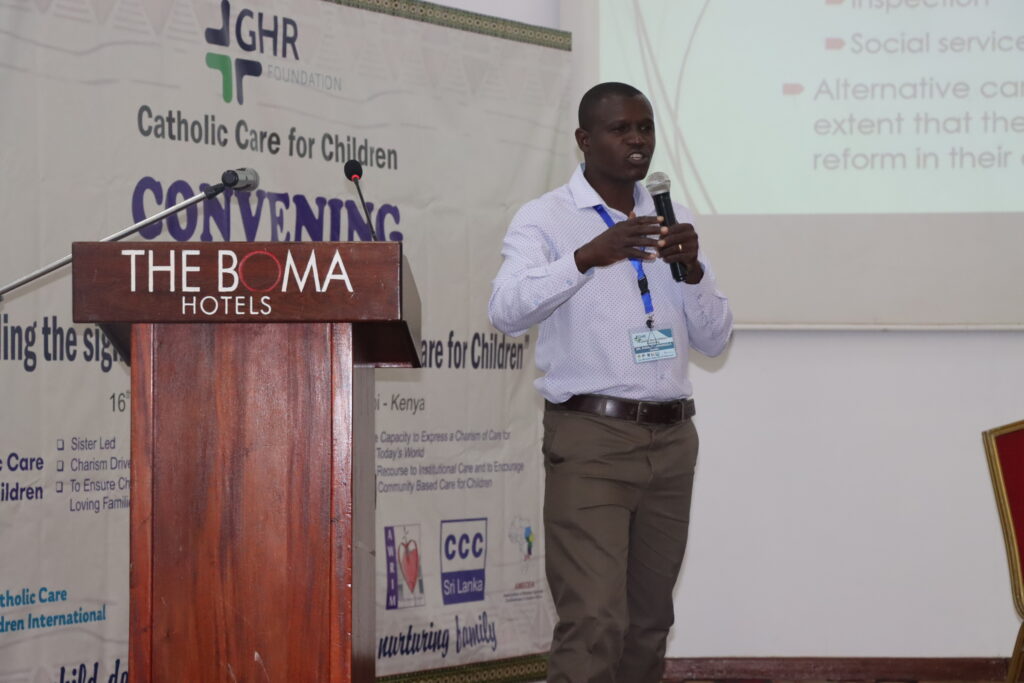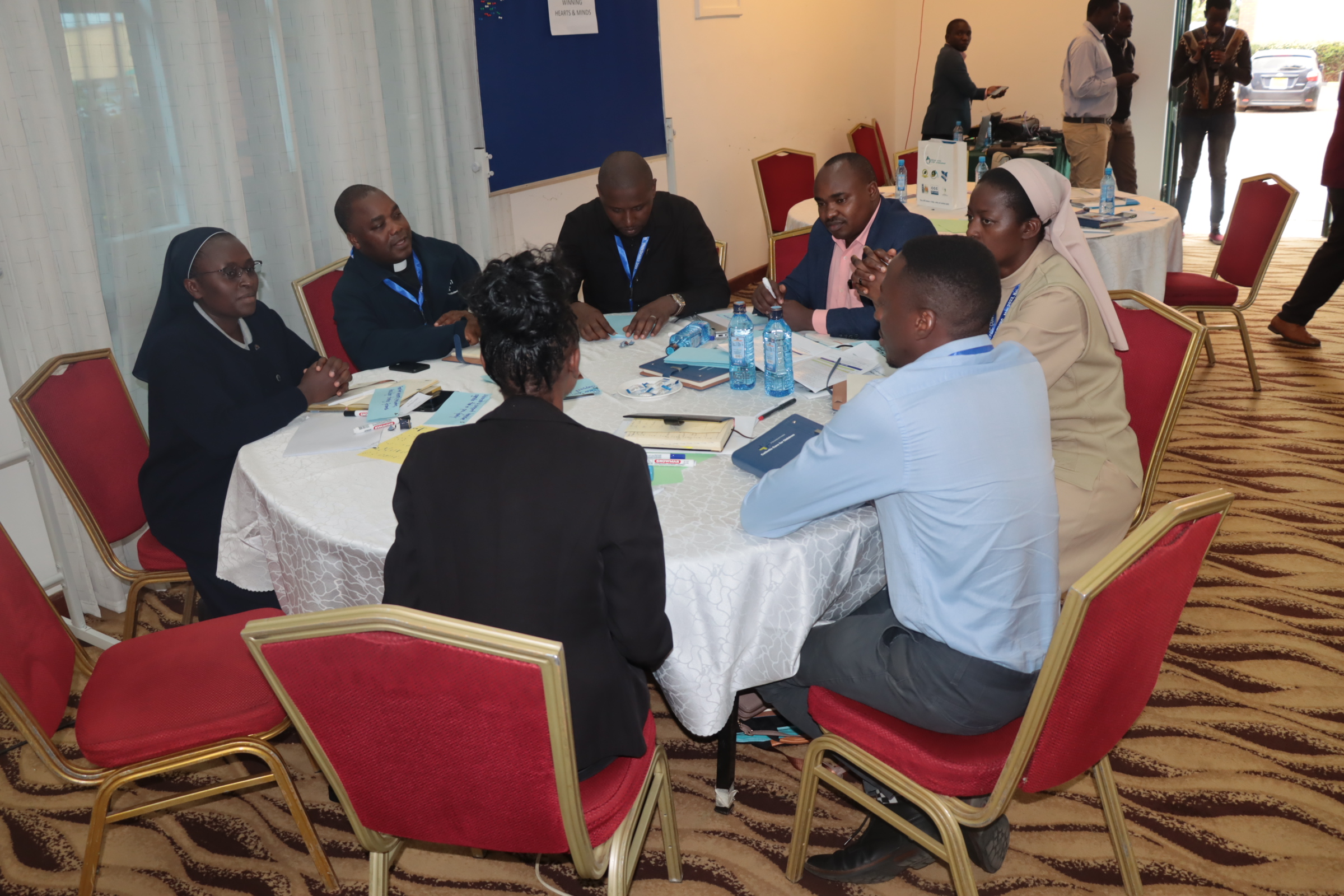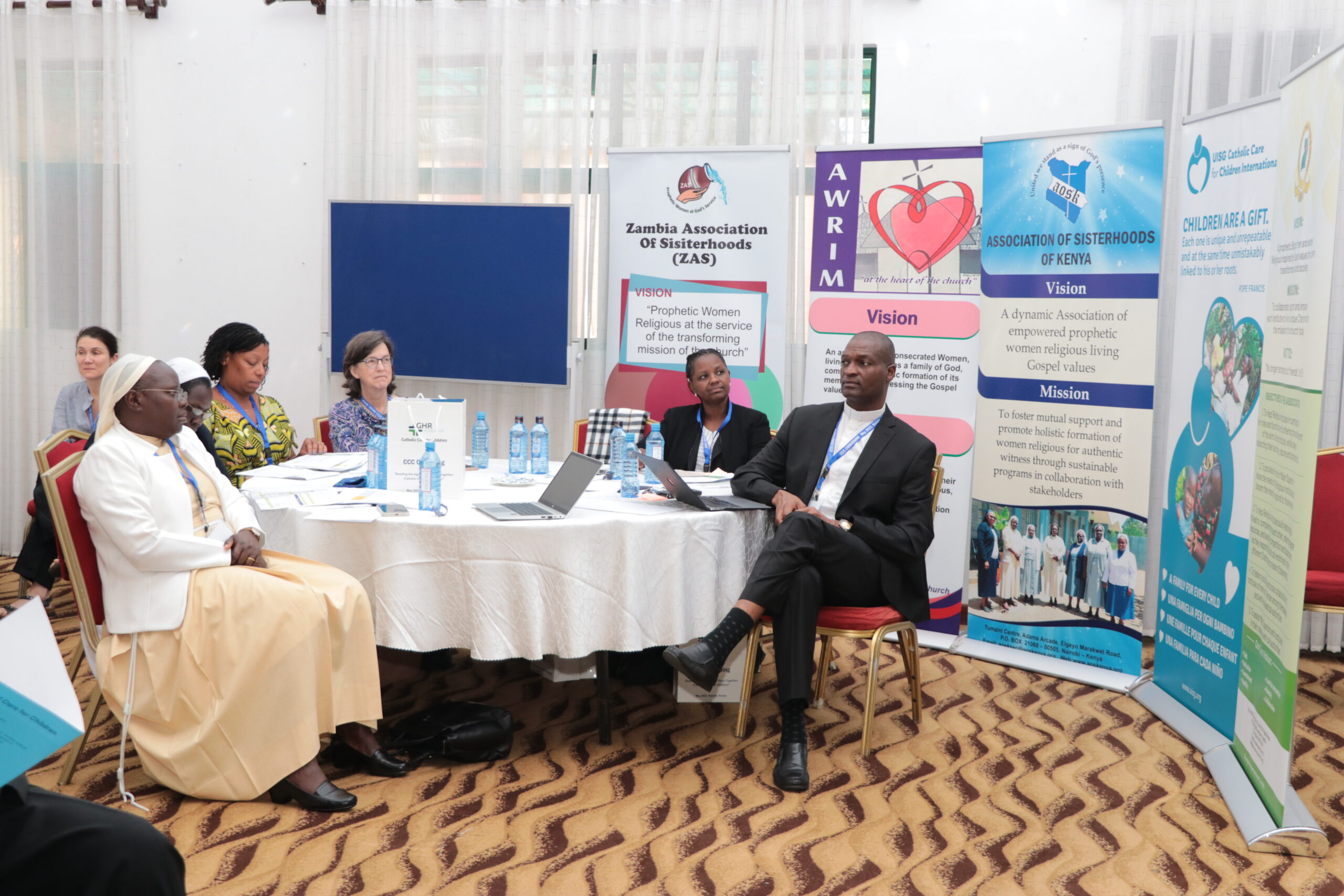AMECEA/CCC: “Children Homes Not An Ideal Environment,” Says Child Protection Researcher

Dr. Ronald Luwangula
Elizabeth Asasha
A veteran child protection researcher has backed the need to blot out the rapidly increasing institutional care of children to embrace systematic reintegration of minors into family and community-based care, a key component in the global care reforms advocated by the Catholic Care for Children Movement.
In his presentation on ‘Emerging Legal Frameworks’ and their implications on care for children titled, on Tuesday, May 16, Dr. Ronald Luwangula cited a series of issues that have led to the trend of institutionalizing children, which, he says has enfeebled child protection and safeguarding efforts in the region.
“We observed that these children mostly experience violence, abuse, neglect, and exploitation while in the institutions; and lack access to education, health, and social support,” stated the trainer of trainees at the commencement of a three-day Catholic Care for Children (CCC) gathering in Nairobi, the capital of Kenya.
The Tuesday morning gathering, convened under the theme, ‘Reading the Signs of the Times Together: Catholic Care for Children’, was dominated by the CCC movement’s advocacy for the gradual systematic integration of children from institutionalized to non-institutionalized care through the Global Child Care Reforms, which recognize the family as the primary natural unit to which the duty of caring for children is vested.
“The reforms proffer that children should remain in their families and only be separated when necessary and for the best interest of the child and that efforts should be made to place them in an appropriate community-based care and not institutions,” noted Dr. Luwangula recapping that when children live in communities they are more likely to realize their right to protection, development, association and survival.
He also brought to bear evidence that has been accumulated over time to patronage the reality that institutions are not the best place for children while recommending the need for childcare and protection systems to shift from overdependence on institutions to having children transitioned into families and communities to safeguard their rights.
The seasoned researcher on issues relating to children and youth, gender, disability, and social norms based his argument on earlier findings of a quartet National Care Reforms study conducted in Kenya, Uganda Malawi, and Zambia to establish the well-being of children in “group homes” key among them historical trends in Child Care, Proliferation of Child Care Institutions, Issues arising from Institutionalization of Children, and the Global Care Reforms.
He explained the rapid emergence of children’s homes to institutionalize children by citing statistics from various sources, saying “Statistics reveal that about 2 million children live in RCFs while others such as Better Network divulge about 8 Million children, and some studies have come up with a medium of 5.3M.” He further observed that the figures in the four research contexts (Kenya, 850, Malawi 126, Uganda 600, Zambia 190) do not reflect the actual number of CCIs in the country since many of them are unregistered.
Luwangula questioned the equipment and quality standards of the “group children homes” while voicing concerns about the mushrooming Residential Care Facilities (RCFs) that are rapidly replacing traditional foster care families and kinship, underlining the potential long-term effects of such setups on children.
“Children are detached from their immediate and extended families, communities of origin and lack meaningful interaction with even the communities within which the institution itself is situated because some of them are gated institutions with schools, churches and other facilities within, denying them the opportunity to interact with other children outside their artificial settings.”
According to the Social Work and Administration maestro, the standard of institutional care is frequently in question because the majority of caregivers fall short of the standards for expected quality care, resulting in the provision of subpar care that is seldom offered in the best interests of the child at heart.
 “Children in institutions where those in charge have an ulterior motive; even sending children to school and paying for their education could be perceived as eating into the owner’s or managers’ profit margin,” remarked Luwangula, a lecturer in the largest and oldest university in Uganda.
“Children in institutions where those in charge have an ulterior motive; even sending children to school and paying for their education could be perceived as eating into the owner’s or managers’ profit margin,” remarked Luwangula, a lecturer in the largest and oldest university in Uganda.
He delved further into the repercussions of long-term institutionalization of children, explaining actual studies that show that institutionalized environments have oodles of negative effects on children’s physical, social, cognitive, emotional, and behavioral health.
“They also endure high levels of stigma and discrimination, and many of them reside in what are known as “children homes,” which are very artificial settings that are not at all like homes but had to be created to fill up the gap engraved by weakened families, to whom biological and social orphans were conventionally entrusted.
Luwangula established, from his research analysis, that children with disabilities are 17 times more likely to be institutionalized than their peers without impairments, and that the majority of minors in CCIs have at least one living parent, begging the question of why they end up in the hands of caregivers.
In response to Dr. Luwangula’s presentation at the convening, government officials from Kenya and Malawi foregrounded the need to embrace Child Care Reforms accenting what the two governments have instituted to that effect.
“As a country, we have done quite a lot towards care reforms in alignment with the statutes that have been presented, and our Kenyan constitution is also a key legal framework anchoring care reforms by upholding the family as the basic unit of society and social order and enshrining the need for the state to support the family unit.” Said Mrs. Mary Thiong’o from the National Council of Children Services (NCCS), Kenya.
She went on to appeal to all actors and stakeholders in children’s services to work collaboratively in ensuring that children are no longer separated from their families and their communities opining that, “When children are disconnected from their families, they lose their identity and are disinherited, and this denies them the right to inheritance, which, I believe is also a God-given right.”
She continued by making a plea to all actors and stakeholders in children’s services to collaborate to ensure that children are not cut off from their families and communities anymore, stating, “When children are separated from their families, they lose their identity and are disinherited, and this denies them the right to inheritance, which, I believe, is a God-given right.”
On her part, Mrs. Trofena Limbani, Malawi’s Principal Social Welfare Officer for family and child welfare services, made a comment on how much more expensive it is to raise a child in a residential care facility (RCF) than in a family.
“A study conducted in Malawi in 2014 confirmed that it is indeed costly to raise a child in an institution that in a family or community setup.” Posited Mrs. Limbani who currently coordinates case management and care reforms at the national level and has been actively involved in the implementation of the reintegration program at Child Protection Case Management in Blantyre District in the Southern region of Malawi.
Dr. Luwagula emphasized that CCIs are a costly adventure compared to family and community-based care, reiterating their inability to withstand unprecedented upheavals, “When we talk about institutional care, it’s quite expensive and not sustainable. Covid-19 could have taught us this because when it struck, our donors were greatly affected, and this compelled us to send the children back to their families.”
“We should be aiming to move from institutional care towards a safe and loving family; either a biological, kinship or foster.” He entreated the audience with a dogmatic expression adopted from the GHR Foundation, which is the chief donor of Catholic Care for Children.
 CCC teams are reducing the need for institutional care by encouraging and facilitating family and community-based care for children without parental care.
CCC teams are reducing the need for institutional care by encouraging and facilitating family and community-based care for children without parental care.
He referenced various legal frameworks with striking alignment to international laws on child protection while lauding that Kenya is one of the few model countries, “Not just in Africa but globally, that have domesticated the UN guidelines to have the national guidelines on alternative care for children.”
“We need to recognize that transitioning from institutional care to family-based care does not eat into our charism and neither does it oust one from one’s job.” He concluded.
Dr. Ronald Luwangula is a doyen trainer in the East African region with a track record of creating case management programs for child protection in Rwanda and Uganda as well as providing technical support to civil society organizations on the prevention and response to sexual violence against boys and girls in Uganda and Zanzibar.


